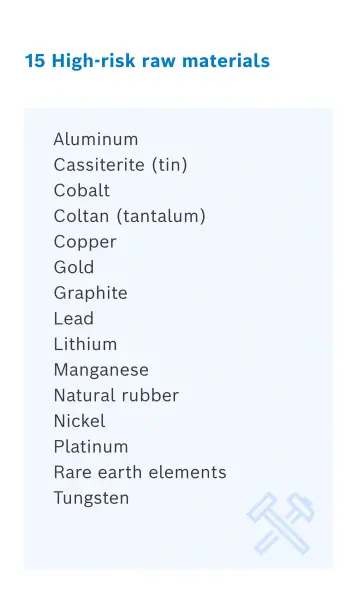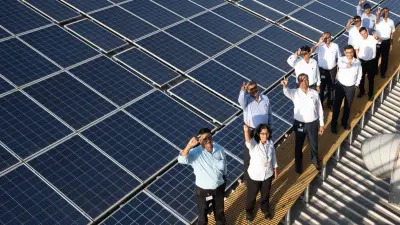More sustainability in supply chains — worldwide

At Bosch, purchasing and logistics work hand in hand for resilient and sustainable supply chains that contribute to a high level of product quality, climate action, and social standards.
Designing supply chains responsibly
Together with our business partners, we want to find answers to the global social and environmental challenges of our time. At the heart of these efforts is all stakeholders’ common understanding of sustainability, which is based on international frameworks such as the principles of the UN Global Compact and the “Basic principles of social responsibility at Bosch”.

On this basis, in our Codes of Conduct for Business Partners we require that our suppliers comply with the generally applicable labor standards as laid down in the Fundamental Principles of the International Labour Organization (ILO). This includes, among other things, renouncing forced labor and child labor, not permitting any form of discrimination, guaranteeing occupational health and safety, creating fair working conditions, and ensuring freedom of association. We also require our suppliers to protect the environment and conserve resources — and expect them to oblige their own suppliers and other third parties to comply with corresponding principles to the best of their ability.
Further developing and strengthening cooperation
Bosch aims to achieve a high level of sustainability and compliance in its supplier network using contract clauses, sustainability-related reviews, and resulting specific packages of measures.
Requirements
We communicate our requirements to our suppliers via our Terms and Conditions of Purchase, our Codes of Conduct for Business Partners, and appropriate contractual clauses.
Assessment
To assess compliance with these requirements, we use systematic methods. Self-declarations by suppliers and third-party audits are used to complement the quick scans and drill-deep assessments that Bosch performs itself.
Further development
By further developing our suppliers’ sustainability performance, we aim to achieve effective and sustainable changes.
We regularly honor outstanding achievements with the Bosch Global Supplier Award.
Compliance with social and environmental standards
As a globally operating company, we recognize our corporate responsibility to respect human rights.
We contribute to improving human rights conditions worldwide by implementing human rights and environmental-related due diligence obligations in our operational processes. At the same time, we actively demand respect for human rights in our global supply chains as well and take appropriate remedial action in the case of violations.

Reducing risks inherent in raw materials extraction
Raw materials extraction and its circumstances are often particularly risk-sensitive from an ecological and social point of view. While Bosch itself only sources very few raw materials directly, potentially high-risk raw materials are processed in primary products and materials.

In an analysis of raw materials, we identified 15 high-risk raw materials that Bosch uses and launched specific risk-mitigating programs. A standard process was established in 2023 for the identified raw materials, which is binding upon the purchasing divisions. Following analysis of the material-specific risks, specific target visions are defined accordingly for each high-risk raw material along its generic value chain. These visions reflect Bosch’s expectations of its suppliers, such as a desired level of certification, and will be the focus of further corporate activities in the future.
As early as 2019, we issued the Bosch Group Policy for Conflict Raw Materials, which describes our approach to the conflict minerals cassiterite (tin), coltan (tantalum), tungsten, and gold. It is integrated in specific agreements for relevant suppliers.
Bosch participates in conflict minerals reporting and in cobalt reporting in accordance with the Responsible Minerals Initiative (RMI). In addition, we are working to ensure that suppliers of materials containing conflict minerals or cobalt have the smelters in their supply chains certified by RMI.



